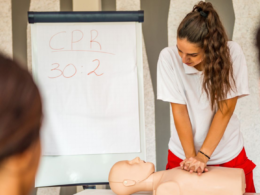We’ve all heard of mindfulness, but what does it mean? Mindfulness is a practice that has been gaining popularity in recent years as an effective way to manage stress and anxiety. Mindfulness is the act of being aware and present moment by moment—not worrying or judging yourself—but just focusing on accepting how you feel in this very moment. This article will explore mindfulness, why it’s important, and how to start incorporating it into your life today!
Have you ever Wondered What Mindfulness is?
Mindfulness is the practice of being aware and present at the moment. It’s not a quick fix to eliminate stress or anxiety but rather an approach that helps make life more meaningful, enjoyable, and balanced. By deeply connecting with yourself through mindful practices like meditation or yoga, you can gain insight into your thoughts, feelings, and emotional patterns to understand better how to react in certain situations and improve your overall well-being.
Practicing mindfulness may help lower stress levels, improve cognitive functioning, and boost happiness by increasing self-compassion for yourself and others. Taking even five minutes each day to focus on yourself will have long-lasting benefits on both physical and psychological health!
Start your journey towards mastering mindfulness by reading this article and learning more about the benefits of mindfulness and how to incorporate it into your life.
What is mindfulness, and Why is it Beneficial to Practice it Regularly?

Mindfulness is being present and fully engaged in the present moment without judgment or distraction. It involves intentionally paying attention to our thoughts, emotions, and physical sensations without getting caught up.
Regular mindfulness offers numerous benefits, including:
Increased self-awareness
Mindfulness can increase self-awareness by encouraging us to observe and accept our thoughts and feelings without judgment, which can help us better understand ourselves.
Reduced stress levels
By being aware of our emotions in the present moment, we can become more aware of potential triggers for stress or anxiety and take steps to reduce them.
Better decision-making skills
Regular mindfulness can also help us make better decisions because we can stay present and think through our options more clearly.
Improved concentration and focus
Mindfulness can help us stay focused on the task and better manage distractions. This can help us become more productive and efficient in our everyday tasks.
Better emotional regulation
Mindfulness can also help us better regulate our emotions to respond to them more healthily.
Greater compassion for oneself and others
Regular mindfulness can increase self-compassion, making us more understanding and kinder toward ourselves and others.
Whether incorporated into daily routines or set aside as a designated time for meditation, mindfulness can be a transformative tool for enhancing overall well-being and living a more fulfilling life. So why not give it a try?
How to Start Practicing Mindfulness with Simple Breathing Exercises?

Mindfulness is all about being present in the moment and finding peace within yourself. One simple way to start practicing mindfulness is by focusing on your breath.
Here is a step-by-step guide to practicing mindfulness through breathing exercises:
- Find a comfortable and quiet place where you won’t be disturbed.
- Sit in a cross-legged position or with your legs outstretched, whichever is more comfortable for you.
- Close your eyes and focus on your breath – observing the feeling of air entering and leaving your body.
- Notice the sensations in your chest and belly as you breathe in and out – notice any thoughts or feelings that arise, but don’t get attached to them – just let them go.
- Repeat this exercise for five minutes, or however long you like.
If your mind wanders, gently redirect your focus back to your breath. This technique may seem simple, but the benefits are profound. With consistent practice, focusing on your breath can help reduce stress and anxiety and improve overall well-being. So take a few moments daily to breathe and connect with your inner self.
Different ways you can use Mindfulness to Reduce Stress and Improve your Mental wellbeing

Mindfulness has become an increasingly popular way of dealing with stress and improving your wellbeing. You can integrate mindfulness into your life in many different ways.
Here are some ways that you can use mindfulness to reduce stress and improve your mental well-being:
- Yoga- Yoga is an excellent way to practice mindfulness as it combines physical exercise with breathwork, meditation, and relaxation to help you focus on the present moment.
- Meditation – Meditation encourages us to be aware of our thoughts and feelings without judging them. It can be as simple as sitting quietly for five minutes and focusing on your breath.
- Journaling – Journaling is a great way to express any emotions or thoughts that you’re feeling without judgment. Writing down how you feel in the present moment can also help you reflect on it later and gain insights into yourself.
- Walking – Walking in nature can be incredibly calming and restorative. Appreciating the beauty around you helps remove your focus from any worries or stressors, allowing you to be mindful of the present moment.
Regardless of your chosen method, incorporating mindfulness into your daily routine can greatly benefit your mind and body.
5 Reasons to Practice Mindfulness Every Day

Every day was made to be lived mindfully. Here are five reasons why you should make mindfulness a daily practice:
1. Productivity
Practicing mindfulness can help improve your focus and productivity levels, enabling you to finish more in less time.
2. Better Decision Making
Regular mindfulness can help you make better decisions by allowing you to think more clearly and objectively. Inner calmness and clarity can help you make more rational decisions.
3. Improved Health
Mindfulness can help reduce stress levels to improve your mental and physical health. This is why it is so beneficial to practice mindfulness every day.
4. Greater Influence
Being mindful of your thoughts and emotions can also make you more influential. When we are aware of our feelings and reactions, we become better listeners and problem solvers.
5. Happiness
Mindfulness can help us be even more appreciative of our lives, which leads to greater happiness and fulfillment. Happiness also has a domino effect on relationships, productivity, and health.
Practicing mindfulness daily is important in cultivating inner peace and harmony in our lives. With regular practice, we can learn to find balance and joy within ourselves no matter what life throws at us. So take a few moments daily to be mindful and appreciate the present moment.
Tips for Implementing Mindfulness into Your Daily Routine
Start small if you want to bring more mindfulness into your life. Here are some tips you can do to start:
- Set aside a few minutes daily to practice breathing exercises or meditation.
- Consider keeping a gratitude journal or taking a mindful walk in nature.
- Find a mindfulness class or group to connect with like-minded people.
- Remind yourself to bring awareness of your thoughts and feelings throughout the day.
- Be mindful of any judgments or criticism you have towards yourself or others.
Over time, these simple habits can greatly impact your mental and physical health. Remember, it’s not about perfection – just taking small steps towards a more mindful life.
Frequently Asked Questions about Mindfulness?
Q: What is the true purpose of mindfulness?
A: The true purpose of mindfulness is to cultivate greater awareness of the present moment and find peace within oneself. It is about fully present in the here and now, without judgment or attachment to thoughts or emotions.
Q: What problem does mindfulness solve?
A: Mindfulness is an effective way to reduce stress levels and improve overall well-being. It can help us become more aware of our thoughts and emotions so that we can better understand them and learn how to manage them.
Q: Does mindfulness make you a better person?
A: Mindfulness can help you become a better version of yourself. Regular practice can help improve your focus and productivity, make better decisions, reduce stress levels, and cultivate inner peace and joy.
Q: Why is mindfulness important for success?
A: Mindfulness is important for success as it can help improve focus and clarity, reduce stress, and cultivate a positive mindset. All of these are essential to success in any area of life.
Q: How often should I practice mindfulness?
A: It is recommended to practice mindfulness every day for at least five minutes, but the frequency of practice will depend on your schedule and lifestyle.
Conclusion
Overall, it is clear that mindfulness can have a powerful and positive impact on our lives. Even if we can’t dedicate hours each day to practice, just a few moments of meditation can make all the difference. Taking the time to focus on our innermost thoughts and feelings while being kind and understanding toward ourselves can assist us in dealing with daily stressors and elevate our sense of well-being.
Remember that mindfulness is something accessible to everyone. There’s no need to become an expert, as even dropping by a few times per week for just 10 minutes at a time—makes it possible to experience its benefits. Mindfulness is an incredibly enriching practice that offers numerous health benefits; it enables us to slow down and appreciate life’s beauty as it passes. So why not give mindfulness a try? You may be surprised by this simple practice’s profound impact on your life.









